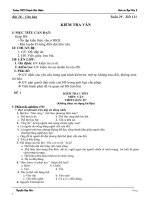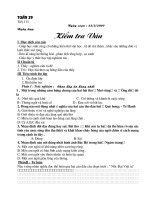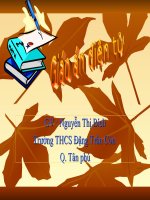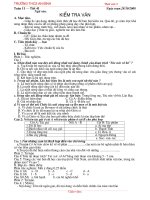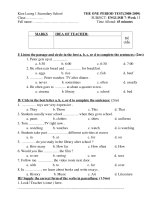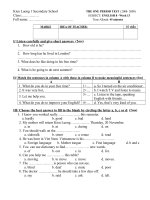Anh Văn 8. Tuần 29. Unit 13. Festivals Fun
Bạn đang xem bản rút gọn của tài liệu. Xem và tải ngay bản đầy đủ của tài liệu tại đây (1.09 MB, 20 trang )
1
put
2
3
put
make
4
hold
5
6
7
perform
award
awarded
Game : Palmenism
performed
performed
8
8
write
write
9
9
10
held
11
made
12
wrote
13
decorate
decorated
14
Lesson 5. Language focus
S + am / is/ are + PP + (by + O).
S + was/were + PP + (by + O).
A. Grammar notes:
I. Passive forms:
1. Passive in simple present ( bÞ ®éng ë hiÖn t¹i đơn )
2. Passive in past ( bÞ ®éng ë qu¸ khø )
Ex (ac.).She plays tennis everyday.
(ps).Tennis is played by her everyday.
(S)
(Obj)
(V) (Obj)
(S) be + PP(V-ed)
by
Ex.(ac). Nam opened the doors.
(Ps). The doors were opened by him.
Form:
Form:
Lesson 5. Language focus
S + will + be + PP + (by + O).
4. Passive in present perfect ( bÞ ®éng ë hiÖn t¹i hoµn thµnh )
3. Passive in simple future ( bÞ ®éng ë t ¬ng lai )
S + has / have + been + P2 (by + O).
We will hold a flower festival in DaLat next year.
=>A flower festival will be held in Dalat next year.
I have visited my friends in Hanoi.
=>My friends have been visited (by me) in Hanoi.
Choose the correct answer
1.Christmas songs for people hundreds years ago.
2. Monthly, letters all over the world.
3. They gold medals many times.
4. A new train in 4 months.
5. Christmas tree in the early 1500s in Riga.
6. Would you like to join us ? a big party
A. was performed B. is performed C. will be performed
A. were written B. are written
C. have been written
A. were awarded B. are awarded
C. have been awarded
A. will be made B. is made C. was made
A. was decorated B. is decorated
C. has been decorated
A. will be held B. was held
C. is held
1234567891011121314151617181920
II. Activity 2 : Compound noun
It’s a rice-cooking contest
noun – V
ing
+ noun
Compound noun / compound word
Bæ nghÜa cho danh tõ chÝnh
English
Math
History
Literature
Geography
Biology Chinese Music
b ?
It’s a bull - fighting festival.
C ?
It’s a car – making industry.
D ?
It’s a flower- arranging contest.
E ?
It’s a rice – exporting country
a ?
It’s a fire-making contest.
f ?
It’s a clothes – washing machine.
Lucky !
Lucky !
I am a
student
He said he
was a
student
C©u nãi trùc tiÕp
C©u nãi gi¸n tiÕp
( c©u trÇn thuËt )
Nam
Mai
John
C©u nãi trùc tiÕp C©u nãi gi¸n tiÕp ( c©u trÇn thuËt )
HiÖn t¹i
Qu¸ khø
Can Could
must have to / has to
I
c
a
n
f
i
x
t
h
e
f
a
u
c
e
t
s
T
h
e
p
i
p
e
s
a
r
e
b
r
o
k
e
n
N
e
w
p
i
p
e
s
a
r
e
e
x
p
e
n
s
i
v
e
Y
o
u
m
u
s
t
p
a
y
m
e
n
o
w
He said he could fix
the faucets
He said the pipes
were broken
He said new pipes
were expensive.
He said I have to
pay him
